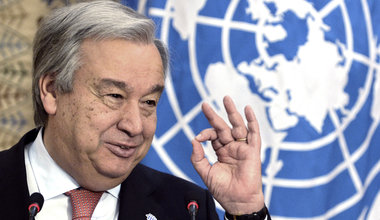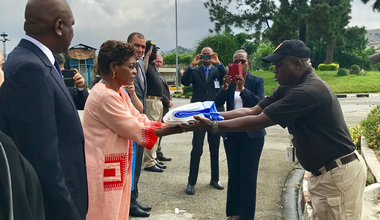LAST OBSERVATION POST IN THE FORMER ZONE OF CONFIDENCE ELIMINATED
UNOCI'S FORCE REMAINS AT THE SERVICE OF PEACE
The 30th of July 2008 is without a doubt a day of symbolic importance in Côte d'Ivoire. It marks the end of the timeframe set by the Ouagadougou Political Agreement (OPA) for the elimination of the last observation post along the "green line" that replaced the former zone of confidence. The UN Operation in Côte d'Ivoire (UNOCI)'s military force was able to meet this deadline.
Under the Ouagadougou Political Agreement, which they signed on 4 March 2007, President Laurent Gbagbo and the Secretary-General of the Forces Nouvelles, Guillaume Soro, decided, among other things, that the zone of confidence (ZOC) would be scrapped. This swathe of land, averaging 20km in width and some 600 km long, from East to West, had separated the belligerents and was monitored by the impartial forces: UNOCI and the French Force Licorne.
The process of eliminating the ZOC began on 16 April 2007 in the central town of Tiebissou, with a ceremony presided over by President Gbagbo, in keeping with the practical modalities defined at a quadripartite meeting on 11 April 2007 in Abidjan between the National Armed Forces of Côte d'Ivoire (FANCI), the Armed Forces of the Forces Nouvelles (FAFN) and the impartial forces.
From 15 September 2007, UNOCI's force set up 17 observation posts along an imaginary East-West line called the "Green Line". This enabled the force to continue carrying out observation, monitoring and support missions for the mixed brigades made up of the FAFN and FANCI that gradually took over police and gendarme functions in the zone.
The OPA also envisaged the halving of the observation posts every two months, until their total elimination. Eight of the posts were dismantled on 30 November 2007. The remainder were reduced to five by the end of January 2008, three by the end of March 2008, one by late May and, finally, by 30 July, all had been eliminated.
REDEPLOYMENT OF UNOCI'S FORCE
So as to better fulfill its mandate of supporting the military aspect of the OPA after the elimination of the ZOC, UNOCI's force also changed its modus operandi. Pursuant to UN Security Council resolutions 1739 and 1765, the Force continues to play an observation role to make sure that none of the two forces resumes hostilities. The Force also supports the Integrated Command Centre (ICC) in providing security for the redeployment of the administration, identification, disarmament, demobilisation and reintegration (DDR) and elections. It also helps provide security for Ivorian political actors of all persuasions, and protects other civilians in imminent physical danger, and continues to monitor compliance by the various parties with the arms embargo in particular.
The UN Force was also redeployed in accordance with its new mandate, and decided to reduce by half its sites in Côte d'Ivoire, closing 24 of the 44 camps and opening four new ones. Thus far 21 have been closed. Pending the opening of new camps in Adzopé, Issia and Divo, the three remaining camps will also be shut down so that the force can reasonably cover the entire Ivorian territory.
By the end of its redeployment, the force will have only 24 camps. It will be spread out throughout the country to create the conditions for the free movement of the population during the elections. It will have the mobility it needs to secure the elections, the flexibility it requires to use its resources in the best possible way to ensure that the peace process is irreversible, and the intervention speed needed to provide security for people and property. Today, in addition to its mandated activities, it conducts more than 200 patrols per day to ensure the security of the population, and reconnoitre all sites identified as polling areas for the upcoming elections.
UNOCI's Blue Helmets help national institutions to plan and carry out the DDR programme, in particular by building supplementary DDR sites, assisting the ICC to ensure the security of cantonment sites, helping to destroy the weapons that have been collected, supervising the cantonment, disarmament and demobilisation process, and stocking weapons that have been collected.
HUMANITARIAN ACTIONS, RECONCILIATION
The human factor is an essential part of the activities of UNOCI's Force. All its activities are done in the interest of the population. In this regard, the contingents' military chiefs and patrols along with the military observers make direct contacts with ordinary citizens, traditional chiefs, and representatives of civil and military authorities. The contingents pool their resources and, using their own money, provide the population with assistance that has an immediate impact, donating food, rehabilitating or building infrastructure, and providing school supplies. Medical care constitutes one of the most important humanitarian activities of the Force, whose 12 hospitals take care of some 600 Ivorian patients per month. For their part, UNOCI's deminers recover and destroy arms, ammunition and explosives that could cause terrible harm to the population, especially children.
 UN
UN United Nations Peacekeeping
United Nations Peacekeeping




